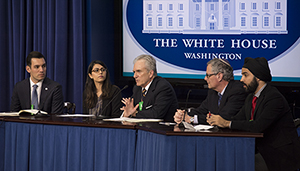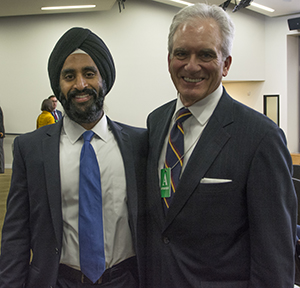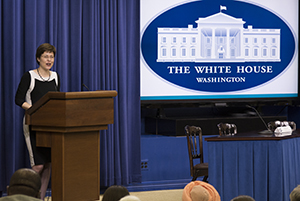BJC joins call for every American to ‘Know Your Neighbor’
WASHINGTON—The Baptist Joint Committee for Religious Liberty joined 14 other nonprofit organizations in launching a project designed to encourage dialogue among Americans of all faiths.
The Know Your Neighbor campaign urges Americans to share their beliefs and learn from people of other religious backgrounds in a spirit of mutual respect.
Understand each other
Brent Walker, executive director of the Baptist Joint Committee, emphasized the need for Americans from varied religious traditions to move beyond stereotypes and learn to understand each other.
 Brent Walker (center) of the Baptist Joint Committee for Religious Liberty participates on a panel with (left to right) Michael De Dora of the Center for Inquiry, Madihha Ahussain of Muslim Advocates, Jack Moline of the Interfaith Alliance and Arjun Singh of the Sikh Coalition. “Our religiously plural democracy and the religious freedom we enjoy depends not just on constitutional protection against governmental interference,” Walker said. “It also depends on the willingness of American citizens on a personal level to understand and respect each other, including our differences.”
Brent Walker (center) of the Baptist Joint Committee for Religious Liberty participates on a panel with (left to right) Michael De Dora of the Center for Inquiry, Madihha Ahussain of Muslim Advocates, Jack Moline of the Interfaith Alliance and Arjun Singh of the Sikh Coalition. “Our religiously plural democracy and the religious freedom we enjoy depends not just on constitutional protection against governmental interference,” Walker said. “It also depends on the willingness of American citizens on a personal level to understand and respect each other, including our differences.”
Horizontal relationships that bridge divisions
Members of the Know Your Neighbor coalition launched the campaign at a White House-convened gathering on American religious pluralism.
Participating in a panel discussion during the event, Walker noted much of his time is spent in a “vertical fight” to ensure government remains neutral on religion, neither establishing it nor interfering with its free exercise. However, he emphasized the importance of involvement by people across the country entering “horizontal relationships” that bridge religious divisions.
Christians, he noted, have “theological warrant for taking the step” of getting to know their neighbors and treating them in neighborly ways.
“When we take seriously the gospel of Jesus Christ, it’s not enough just to know a neighbor, but rather to be a neighbor,” he said.
‘Love first’
The Know Your Neighbor website features several testimonials, including one by George Mason, pastor of Wilshire Baptist Church in Dallas. He described how his church ministered to one of its members, Louise Troh, when her fiancée, Thomas Eric Duncan, became the only person on American soil to die of Ebola. Troh subsequently was quarantined.
“My first thought on learning this was, ‘Could I visit her?’” Mason recalled. “Instinctively, I sensed that in times like these, the role of a pastor is to be present, but in this case being present carried more risk. I kept thinking about the words of 1 John: ‘Perfect love casts out fear.’ This was one of those existential moments when I understood that we often have to choose between fear and love.
“Gratefully, the four people who had been exposed to the virus did not contract Ebola. Nevertheless, they will never be the same. Neither will our church. Neither will I. The saying ‘safety first’ is not from the gospel. ‘Love first’ is the way of Christ, and these must be the guiding words of all who follow him.”
‘Have faith in each other’
 BJC Executive Director Brent Walker poses with Gurwin Singh Ahuja, the co-founder of the National Sikh Campaign and the organizer of the Know Your Neighbor project.Gurwin Singh Ahuja, a young Sikh man concerned about challenges within his own community, whose members often incorrectly are perceived as Muslims, created the Know Your Neighbor initiative.
BJC Executive Director Brent Walker poses with Gurwin Singh Ahuja, the co-founder of the National Sikh Campaign and the organizer of the Know Your Neighbor project.Gurwin Singh Ahuja, a young Sikh man concerned about challenges within his own community, whose members often incorrectly are perceived as Muslims, created the Know Your Neighbor initiative.
“We are a nation of Christians, Muslims, Jews, Hindus, Sikhs, Buddhists, nonreligous people and more,” Ahuja said. “We live and work together, and we need to have faith in each other.”
In addition to the Baptist Joint Committee, other members of the Know Your Neighbor coalition include the American Civil Liberties Union, the Becket Fund for Religious Liberty, the Center for Inquiry, Hindu American Seva Communities, Interfaith Alliance, Interfaith Youth Core, Islamic Networks Group, Muslim Advocates, National Council of Churches, National Sikh Campaign, Religious Action Center of Reform Judaism, Religions for Peace USA, the Shoulder to Shoulder Campaign and Sikh Coalition.
‘No second-class faiths in the United States’
 Melissa Rogers moderates the White House-convened gathering on religious pluralism.Melissa Rogers, executive director of the White House Office of Faith-Based and Neighborhood Partnerships, moderated the event where the coalition launched its campaign. The gathering also included representatives from various government agencies, including Vanita Gupta, head of the civil rights division with the U.S. Department of Justice, who pointed to a recent marked increase in hate-related incidents directed toward Muslim Americans and others who are perceived to be Muslim.
Melissa Rogers moderates the White House-convened gathering on religious pluralism.Melissa Rogers, executive director of the White House Office of Faith-Based and Neighborhood Partnerships, moderated the event where the coalition launched its campaign. The gathering also included representatives from various government agencies, including Vanita Gupta, head of the civil rights division with the U.S. Department of Justice, who pointed to a recent marked increase in hate-related incidents directed toward Muslim Americans and others who are perceived to be Muslim.
“Let’s be clear. There are no second-class faiths in the United States of America,” said Rogers, former general counsel with the Baptist Joint Committee. A commitment to religious pluralism and American principles means defending “people who may feel at risk today” and choosing inclusion over exclusion, she noted.